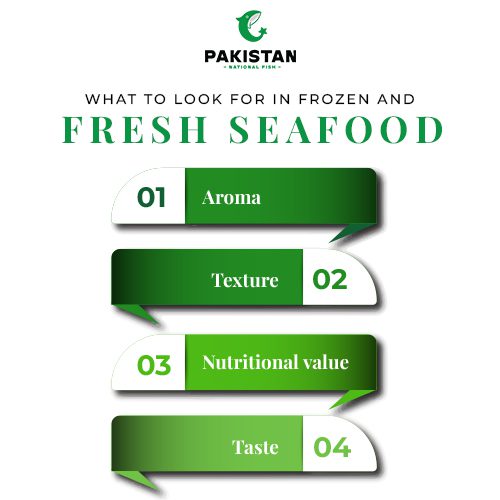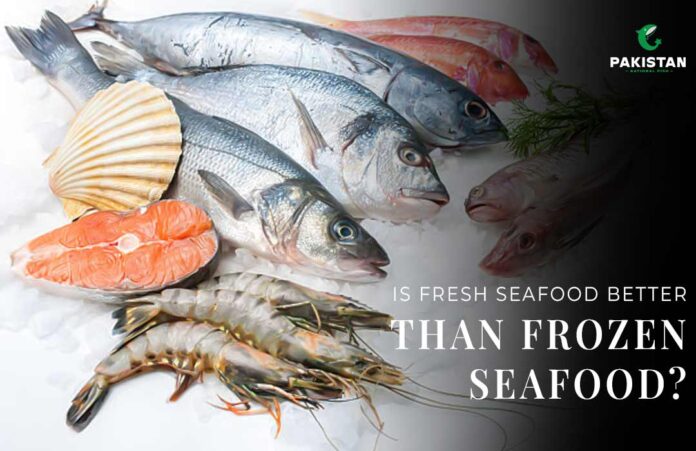There’s a common misconception that “fresh” seafood is always preferable to “frozen.” This isn’t always the case, though. Let’s examine the reasons why frozen seafood can be superior to fresh seafood in Karachi, if not better. When it comes to seafood, there is usually a lot of discussion over whether it is better to eat it fresh or frozen. You should think about the several factors when determining which one will end up on your dinner plate.
We’re going to get into the fresh vs. frozen seafood controversy to assist you in better planning your next dinner while you consider these fish considerations.
What To Look For In Frozen And Fresh Seafood?
When choosing between frozen and fresh seafood, keep the following aspects in mind:

1. Aroma
Your fresh seafood shouldn’t smell overly pungent or “fishy”. It should smell like the sea, but anything that has an off-putting smell could be a sign that your fish isn’t as fresh as you believe.
2. Texture
The texture of fish might reveal a lot about how fresh it is. Steaks and filets ought to appear solid, juicy, and fresh. Fish and shellfish shouldn’t appear dry or have an excessive amount of fluids. In fish, look for glossy skin, cherry-red gills, and clear, brilliant eyes; in shellfish, look for clean, closed shells.
3. Nutritional Value
Fish does not lose any of its nutritional value and health benefits when it is frozen. The freezing technique does not affect fat, protein, or vitamins. However, part of the water content may be decreased by thawing the fish. Certain water-soluble vitamins and minerals may be present in the water.
You can keep the vitamins and minerals in the fish if you use all of the water that is lost during cooking. Fresh fish retains all of its vitamins and minerals because it doesn’t lose any water content.
4. Taste
Over time, the flavour of frozen fish may start to fade. The shellfish should be consumed within 3–12 months and frozen raw fish should be utilized within 3–8 months. It could be time to discard your frozen fish if you see any indications of freezer burn.
Advice For Buyers Of Fresh Seafood
When buying fresh fish at the grocery store, keep an eye out for the following crucial characteristics:
- The fish counter shouldn’t have any unpleasant smells, such as ammonia or a “fishy” scent.
- Fish ought to sparkle just a little bit.
- Steer clear of fish that seem dry or have strange colouring.
- Clear, complete eyes with vivid red or pink gills should be present in whole fish eyes.
- Sunken, cloudy eyes are a sign of subpar fish.
- Verify that the edges of fish fillets and steaks don’t have any browning, yellowing, or darkening, especially if they seem dry or mushy.
- Once purchased, store it in the refrigerator as soon as possible to keep it cool!
Advice For Buyers Of Frozen Seafood
Purchasing frozen fish is a simple process. A package of frozen fish should have a few things on it, but these are all pretty common sense things to check for.
- Check for bits of ice in a package. There’s a possibility that huge crystals partially (or totally) thawed out and were then refrozen. Purchase a package not like that.
- Verify if the packing is undamaged. It’s simple to do this; simply make sure that nothing is exposed, not even the plastic.
- Make sure the fish is truly frozen by checking its consistency; well-stored frozen fish should have no visible thawing and be as hard as stone with no soft patches.
- Choose low-mercury fish like salmon, sardines, trout, and herring.
- Avoid high-mercury fish like swordfish, shark, tilefish.
- Source sustainably for a healthy diet.
- Check freshness through eyes, body, and scent.
- Store fish refrigerated, and check for pollutants.
- Purchase from reliable suppliers with high turnover rates and good hygiene standards.
Benefits Of Frozen Fish
Frozen fish is a fantastic option for consumers because it provides a lot of advantages. Here are a few main benefits:
1. Freshness Maintained
Frozen fish is frequently flash-frozen soon after it is caught, preserving its texture, flavour, and freshness. This procedure guarantees that the seasonal fish will remain of excellent quality until it is time to cook it.
2. Nutrient Preservation
By quickly freezing vital ingredients including vitamins, minerals, and omega-3 fatty acids, frozen fish like fatty fish maintains its nutritional equality with fresh fish.
3. Longevity
Frozen fish is a practical way to stock up and cut down on the number of shopping excursions because it can be stored for several months without experiencing a noticeable loss of quality.
4. Decreased Waste
Since frozen fish does not decay as quickly as fresh fish, its longer shelf life contributes to a decrease in food waste.
5. Microbial Control
By freezing fish, parasites and other dangerous microbes that could be found in raw seafood can be eliminated. This makes using frozen fish safer, particularly when making raw foods like sashimi and sushi.
6. Reduced Contamination Risk
Compared to fresh fish, properly frozen fish are less likely to become contaminated by bacteria while being transported and stored.
7. Resource Management
Fish populations can be better planned for and managed through freezing, which helps to ensure a sustainable supply and prevent overfishing.
8. Effective Distribution
Since frozen fish can be moved over large distances more effectively than fresh fish, the carbon footprint of fresh fish transportation is reduced.
9. Ready-to-cook
A lot of frozen fish items are already portioned, cleaned, and occasionally even seasoned, which cuts down on preparation time and makes it simpler to incorporate seafood into regular meals.
10. Flexibility In Storage
Since frozen fish may be kept for extended periods, customers can plan meals without feeling obligated to use the fish right away.
11. Decreased Spoilage
Freezing lessens the possibility of food spoiling while being transported and stored, which lessens food waste and its negative effects on the environment.
12. Energy Efficiency
When compared to the logistics of swiftly transferring fresh fish while preserving its freshness, bulk frozen fish transportation may be more energy-efficient.
13. Cost-effective
Because frozen fish may be frozen in large quantities and with less waste, it is frequently less expensive than fresh fish. This makes it a cost-effective choice for a lot of customers.
14. Availability
Regardless of the fishing seasons, frozen fish is consistently accessible throughout the year, offering a wide range of seafood choices.
Conclusion
Frozen fish is a feasible and frequently chosen choice because it provides quality preservation, nutritional value, safety, sustainability, and convenience. It is a premium, wholesome, and practical substitute for fresh seafood that works with contemporary lives and environmental concerns. Look through the freezer section for enticing and healthy choices.


